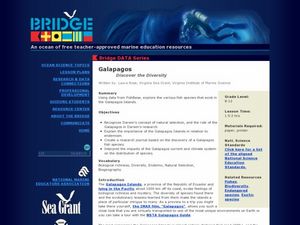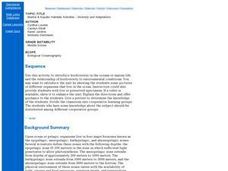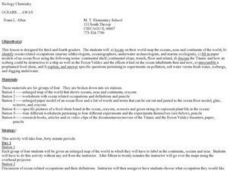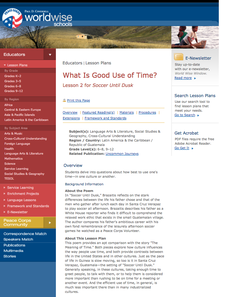Curated OER
Galapagos - Discover the Diversity
Pretend you are exploring a newly discovered species of fish in the Galapagos. Your budding marine biologists access FishBase Database's list of marine/brackish fishes and choose one to research. The link through this website does not...
Curated OER
For the Fun of It
Students view pictures of Amelia Earhart and discuss the social and historical context of her life. They read excerpts of Earhart's autobiography "The Fun of It" and analyze her purpose in writing it.
National Geographic
Eat an Alien Invader
If you are looking for a lesson about invasive species to ocean habitats, you have arrived! Introduce the concept to learners and have them read an article about marine invasive species. Vocabulary, relevant web links, and a cute...
Curated OER
Mammals of the Deep Blue
Third graders study ocean mammals. They explore various websites and databases to answer questions and record answers about whales and dolphins. Finally they use the information obtained to write a report about them.
Curated OER
Prince Ibrahima
Sixth graders read and utilize the facts from the story "Abd al-Rahmen Ibrahima" by Walter Dean Myers to analyze the main character's life which is ruined by conflict, jealousy, and greed. Journal entries are created in response to the...
Curated OER
Sheffield Island Adaptation Activity
You don't have to visit The Maritime Aquarium to use this plan, but you would need to find a location where a variety of bird species live, re-write the activity worksheet to incorporate the local species, and purchase field guides for...
Curated OER
7th Science Quiz
This seventh grade life science quiz has a professional appearance and well-written multiple-choice questions. However, it seems to cover too broad a variety of biology topics for only 15 questions to fully assess. There is one question...
Curated OER
Raw Seafood ~ On the Half Shell
The topic is fascinating, but there is not much for learners to do here. Food borne illness has always been a problem for humans to face, and here, data from the Center for Disease Control is analyzed. Learners look at the number of...
Curated OER
Graphing Iron Data
Students apply a data set to create a graph show how iron ore impacts an ecosystem. They explain how the iron effects the distribution and abundance of phytoplankton in coastal ecosystems using spreadsheet software.
Curated OER
Lesson Plan fo The Magic Eyes of Little Crab
Interested in a "how and why" story to read with young students? In this storytelling lesson, readers will discuss sea creatures, focusing on practicing new terminology through retelling the story. This resource provides a list of...
Curated OER
Marine & Aquatic Habitats Activities - Diversity and Adaptations
Students analyze biozones and how to identify and diagram them. They also research which organisms can adapt to different biozones.
Curated OER
All That Glitters...
Young scholars study that white light (visible light) is comprised of all colors of the spectrum. They study that the quantity of light decreases with increasing depth in the ocean. They study that the quality of light changes with...
Curated OER
Current Events and Fish
Fifth graders examine current events impacting aquatic life in their communities. They search for newspaper, magazine and television reports for information about aquatic life in local bodies of water. Students can write letters to...
Curated OER
Whale Watcher Game Lesson
Young scholars participate in an online whale watching game. They identify the reasons for migration and describe the route. They make predictions on what would happen if the ways did not migrate.
Curated OER
Oceans Away
Learners explore oceans. For this science lesson plan, students locate oceans, seas and continents of the world, identify ocean-related occupations, and complete activities pertaining to food chains as well as pollution.
Curated OER
Wild Arctic
Students explore key terms, including food web and food chain. They discuss Arctic plants and animals, devise at least three Arctic food chains and create a food web showing connections among Arctic life.
Curated OER
Changing With the Tide
Students describe three different aspects or life forms of the salt marsh. They compare and contrast the low and high marsh. Students explain what happens in different areas of the marsh at low and high tide; and explain the roles...
Curated OER
Food Chains & Food Webs
Tenth graders examine how energy is lost through different trophic levels. In this trophism instructional activity students construct a food web and view a video.
Curated OER
Gray Whales
Explore the majestic grey whale while deepening your understanding of animal adaptations. Grey whales from head to toe are specifically designed to fit their environment. Learners will examine the ways in which the flippers, head, body,...
Curated OER
Design a Deep- Sea Vertebrate or Invertebrate
Learners design a deep-sea animal. In this research based lesson, students research and design a vertebrate or invertebrate that lives in a methane hydrate habitat. They compile a class chart of the adaptations animals have in this...
Curated OER
Blue Planet: Seasonal Seas
Students study and research marine invertebrates. In this marine lesson plan students create an illustrated report and help complete a class exhibit.
Curated OER
Environmental Problems and Solutions
In this environmental problems and solutions worksheet, students are given a list of 25 environmental problems. They match them with a given solution and paste the matching pairs to a piece of construction paper.
Curated OER
What Is Good Use of Time?
Students delve into questions about how best to use one's time-in one culture or another. They explore the kinds of choices students will make about their use of time and consider the statement: "We are shaped by the values of the...
Curated OER
Bad Algae!
Students explore algal blooms. In this ecosystem and health instructional activity, students define and describe harmful algal blooms, then discuss ways in which the impact of these algal blooms could be reduced. Students...

























